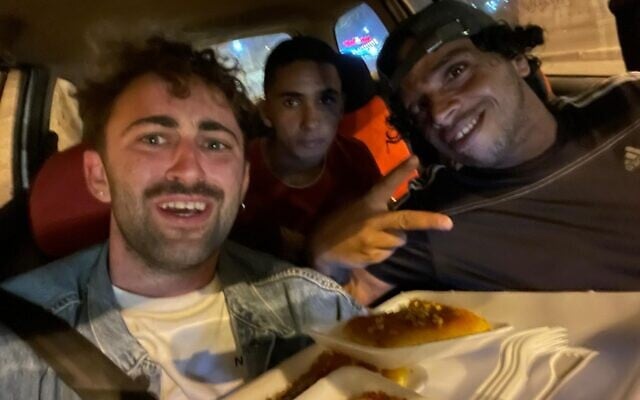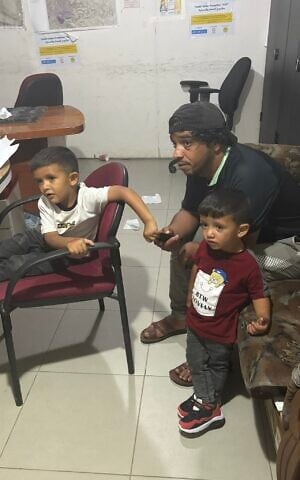


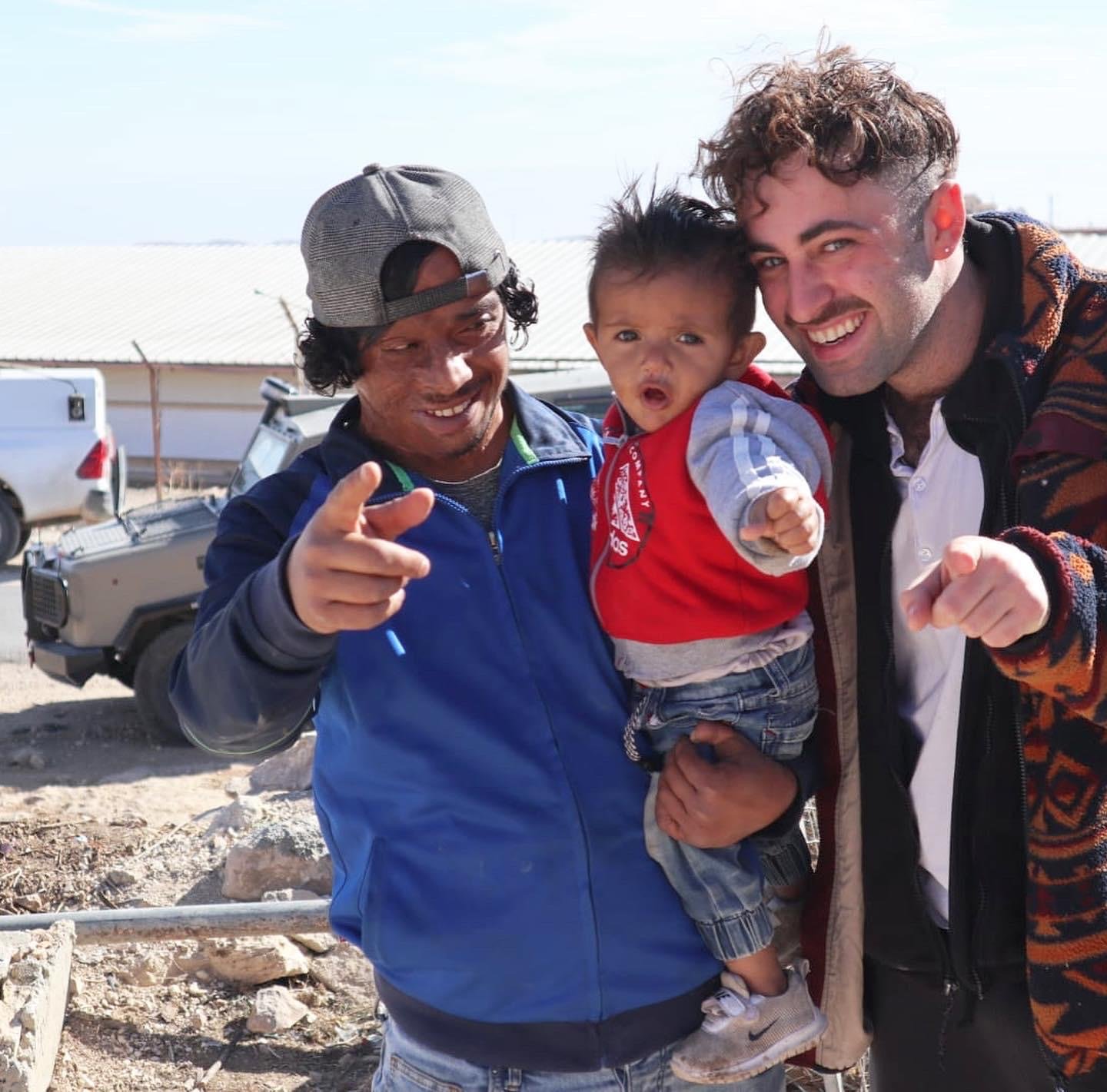
Israeli-American peace activist Mattan Berner Kadish remembers the first thing his friend Awdah Hathaleen said to him when they met in 2021: “Why are you wearing that jersey?”
“I was wearing an Arsenal soccer jersey,” said Berner Kadish. “He wasn’t a fan of the team, and I think he was just so shocked that an American activist even liked soccer.”
Berner Kadish was visiting Umm al-Khair, Hathaleen’s small Bedouin village in the South Hebron Hills with a group of Israelis learning Arabic and providing a protective presence as a buffer in case of any confrontations with belligerent settlers or the IDF. It was the beginning of a friendship that would stretch across years, languages, and borders.
“Pretty quickly, Umm al-Khair became my place, and Awdah quickly became the conduit for my time there,” Berner Kadish said.
They disagreed on things sometimes — argued even — but that was part of their bond.
“I told him what I felt, even if I knew it wasn’t what he wanted to hear. He respected that,” Berner Kadish said. “I’ve watched his kids grow up. We played soccer together, cooked together, and took trips together.”
Berner Kadish and Hathaleen had recently planned to build a soccer field for the local community. A donor had pledged tens of thousands of dollars; construction was days away.
Hathaleen’s life was cut abruptly and painfully short on Monday evening, when he was allegedly shot at close range in the chest and killed by a settler in broad daylight near his home. The alleged shooter, Yinon Levi, is a figure well-known to human rights monitors and sanctioned by the UK, the EU, and, previously, the US under the Biden administration. Levi, who runs an illegal farming outpost in the area, maintains that he acted in self-defense after being attacked by a group of Palestinians throwing rocks at him.
“I watched him die,” said Berner Kadish, who is staying in the village and was just feet away at the time. “Awdah was on the floor, bleeding. He had a gunshot wound.” Berner Kadish ran toward Levi, who was still holding his weapon. “‘You just killed someone,’ I told him. He looked at me and said, ‘And I’m glad I did it,’” Kadish alleged.
Berner Kadish said that three IDF soldiers later told him that they wished they’d pulled the trigger themselves.
The soccer field, if it is ever built, will likely serve as a memorial to Hathaleen.
Hathaleen’s murder has reverberated deeply across the world, including within Israel’s peace and activism community and Jewish communities abroad, where he was widely known and beloved.
For many Israeli and international activists, Hathaleen — who featured in the Oscar-winning documentary “No Other Land,” which chronicles Israel’s demolitions in the West Bank village of Masafer Yatta — was the first person they met when visiting the region, and the one they remembered. “If you went to Masafer Yatta, you probably went to Umm al-Khair,” one activist told The Times of Israel. “And if you went to the village, you probably met Awdah.”
Acting as an unofficial ambassador, it was Hathaleen who greeted visitors, organized delegations, translated for journalists, and told them about his life under Israeli rule — what it meant to be a Bedouin Muslim man, an English teacher, a father of three, and a believer in nonviolent resistance.
He hosted, his friends estimate, hundreds — and more likely thousands — of Israeli and Jewish activists over the years, building close relationships with many.
“Awdah loved meeting new people and telling the story of his community. He also loved learning so much about other places that he wasn’t able to travel to freely. He found joy in it,” Berner Kadish said.
“He seemed like a true gentleman, deeply committed to his community while violence surrounded him,” said Rabbi Lev Taylor of Kingston Liberal Synagogue in England, who met Hathaleen in 2024 while volunteering with Rabbis for Human Rights.
“His murder has sent shockwaves across many parts of the British Jewish community, since so many had met him,” Taylor said.
Danielle Bette, communications director at Yachad, a British Jewish group that organizes educational tours in the West Bank, first met Hathaleen in 2021.
“He was always kind, very quiet, incredibly friendly and welcoming,” she said. “He was someone who gave people hope in an area that doesn’t have a lot of hope.”
Bette recalled a recent tour with British rabbis in which Hathaleen wasn’t even scheduled to speak — he was just there to make sure everyone felt safe.
“That visit had already been marked by violence — another settler had tried to ram his car into our group earlier — and the time we spent in Umm al-Khair with Awdah and the kids running around was the calmest part of the day,” Bette said.
For Bette, Hathaleen’s openness was what made him extraordinary.
“He grew up seeing Israelis with guns or bulldozers,” she said. “But Awdah welcomed Israelis and Jews into his village. He showed them there are those who want to listen, to stand in solidarity. That’s not easy — and it’s not to be taken for granted.”
Hathaleen saw educating children as his primary work, said Bette, and used those interactions to model a different kind of resistance.
“He was showing young people that you can choose nonviolent resistance by speaking to people. And he was an example of that,” she said.
Hathaleen’s family had already endured a devastating loss in 2022 when his uncle, Haj Suleiman, was killed when an Israeli police tow truck ran him over. No one was held accountable.
But despite that, and even though “he had known tanks, guns and occupation all his life,” Taylor noted in a sermon that he wrote following Hathaleen’s murder, “[Hathaleen] worked with Israelis to protect his home and build a peaceful future.”
When Bette learned that Hathaleen had been shot, it felt surreal. “He was known for advocating in nonviolent ways,” she said. “And then he was killed, shot at close range, in the place he had tried to protect through peaceful means.”
The aftermath of Hathaleen’s killing has only deepened the grief and anger felt by those who knew him. His alleged shooter, Levi, was almost immediately released to house arrest, and activists have no faith that he will ever face any accountability for his actions.
The army has declared Umm al-Khair a closed military zone, expelled mourners, and arrested 18 residents, mostly male relatives of Hathaleen. At least 17 remain in detention despite not being charged with any crime. The army disrupted efforts to bury Hathaleen’s body, demanding that the family accept conditions such as limiting the funeral to 15 people before returning his remains.
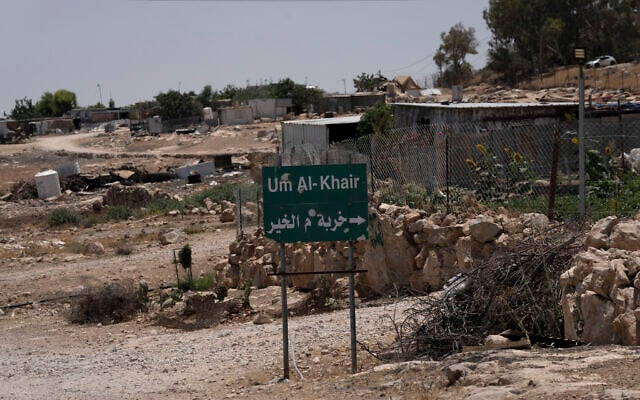
Meanwhile, an excavator that had injured Hathaleen’s cousin the day of the shooting continues to operate in the village, destroying land and water lines, Berner Kadish said.
The perceived lack of accountability didn’t surprise Bette, who believes settler violence is not an aberration but a daily and intensifying reality.
“I don’t have faith in the system’s ability to give justice to a Palestinian who was killed in the West Bank,” she said. “It’s not just a few violent thugs. There’s less and less protection for Palestinians, and more and more pressure. Entire communities are leaving — not because they want to, but because of fear, harassment, and demolitions.”
In that context, Hathaleen’s approach was radical, said Bette: “He chose activism through dialogue. In a place constantly under attack by people who present themselves as Jewish, he was someone who said, ‘No, we’re going to open our homes, speak to people, and build relationships.’ That’s not an easy job to do. And he did it.”
“This shouldn’t be a left-wing issue,” she added. “This should be about who we are as Israelis and what we want our country to look like. We need to decide if people like Yinon Levi and [Itamar] Ben Gvir are the face of Israel — or if we are.”
“If this is what Israel has become, if this is what we dreamed of for thousands of years, then you got it. But it won’t be me,” said Berner Kadish. “This was a man of peace. This was someone who truly, genuinely, deeply believed that things could be different.”
It shouldn’t matter, many of his friends noted, that Hathaleen was a kind, gentle, nonviolent, and peace-loving person — a man who devoted his life to advocating for his community and peace for Israelis.
“It shouldn’t matter, because even if he wasn’t all of those things, nobody deserves this,” said Bette.
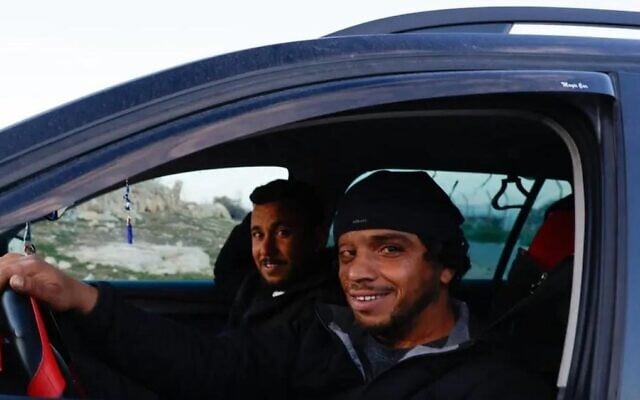
“I could tell you about how good he was at guilting people to try and stay an extra night, how much he loved Real Madrid, how much he loved his kids, how much he loved to barbecue, how easily he bonded with so many people from so many different places,” Berner Kadish said. “Or how he deserved so much more; how strong and resilient he was, and how he never should have had to be.”
Awdah Hathaleen was 31. He is survived by his wife and three children.

